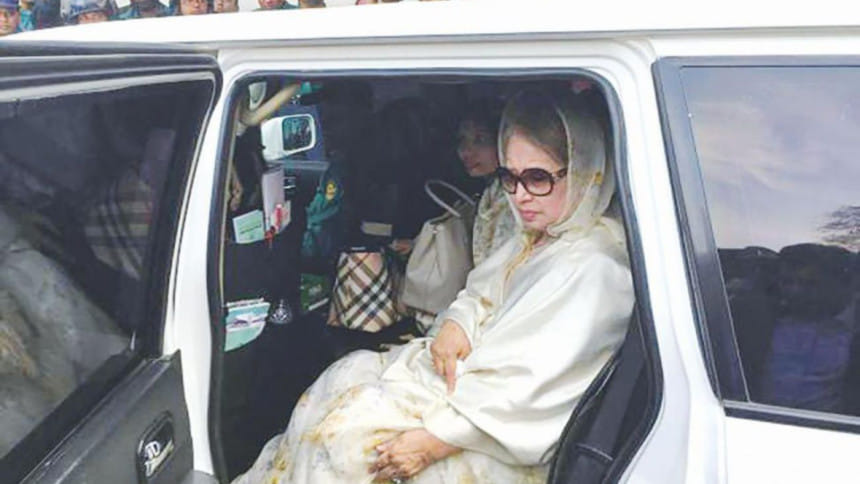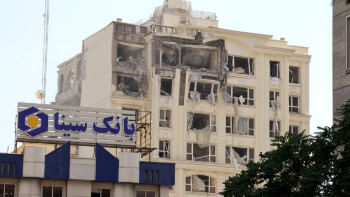Implications of Khaleda's imprisonment

It was a surreal situation not witnessed in recent times in this country. Just at a time when the prime minister was addressing a political meeting in Barisal, a former prime minister was being escorted to jail to start her 5-year prison sentence. The comparison of the two situations may appear irrelevant to some, but the verdict certainly has serious implications, not only for the BNP but also for national politics. The talk of the town is whether Khaleda Zia would be able to participate in the next general election. There are mainly two clear but different verdicts on this issue. And even now two MPs, one of them a minister, are holding their parliament seats and cabinet post even after being awarded jail sentence. One of them has been awarded 13 years, on charges of corruption.
However, it is not the intention to pass a value judgment on the verdict but dwell on its effect on national politics. Needless to say, internment of Khaled Zia will add a new dimension to the future political scenario of the country.
We believe that a legal case should be fought in the court of law and not on the streets. And to our great relief, the day of the verdict passed off with only a few sporadic instances of clashes in some parts of the country, contrary to speculations. To see the BNP leadership urging the supporters to abjure violence is a good sign, and one can only hope that its future political programmes will be held peacefully. I feel it is time for the party to focus on the consequences in the event of the BNP chief being barred from participating in the elections or even her continued incarceration during the process of her bail petition with the election very much round the corner. Trial process in this country can be a very long drawn affair, and no one can say when a particular case gains momentum, or loses impetus.
I feel there will be implications on two counts: impact on Khaleda Zia as the chairperson of a party who has been in its sole command for the last 37 years, and its bearing on the BNP as a party; and the likely effects of the imprisonment of Khaleda on national politics.
Although it is not the first time that the BNP chief has found herself in prison, it is certainly the first time she has been convicted of graft and given rigorous imprisonment. In fact, this is the first time that either a head of the state or of the government has been awarded rigorous imprisonment. There is of course the emotional aspect of the state that she finds herself in, being convicted and jailed. But from the point of view of running the party, it is only she who has exercised direct control on the functioning of the party ever since taking charge of the party, which really has been a one-man show where it was only her writ that ran.
And that brings us to the second strand of the first issue: impact on the party. Certainly, these are troubling times for the BNP. One could say that the party had faced a similar situation in 2007 during the time of the caretaker government. But she was not the only party chief to be incarcerated during that time, and neither was a parliamentary election looming.
Naturally, the responsibility of running the party has devolved on her son, quite like a matter of inheritance and right of primogeniture. Apart from the fact that Tarique Rahman has been out of the country for more than 10 years and is a fugitive, he has also been convicted in this case and given ten years in prison. Legal aspects aside, the practical aspect of it is quite unique. One wonders what impact an acting party chief would have on the party, and how his decision making will be impacted, being detached from his ward by more than six thousand miles. Can a political leader be an absentee landlord of a party? And there are dissensions too in the BNP. There are reservations not only about Tarique's leadership qualities but also about his running the party. His personal rectitude is also a matter of concern to many party leaders. Can he garner enough support from other senior leaders in Dhaka to be effective enough? These are the priorities that BNP should address.
And of course, the political front cannot remain unaffected by what has happened in the legal front. We had commented on the political impact of the verdict in these very columns last week, but a few points merit repetition. The sentencing has come in an election year, when one major party has already launched its election campaign while another has been thrown into disarray. What will be the nature of election should the BNP decide to boycott it?
BNP sees this as a political verdict of a political case, and Khaleda Zia has given a call, reminiscent of Gen Macarthur's when the American General was forced to withdraw from the Philippines, that she will be back. (Macarthur did return) It would be a miscalculation for the AL to write off the BNP or Khaleda Zia. Even after nearly a decade out of power, and virtual political wilderness, the BNP commands substantial support. The turnout at various places on the way to the BNP chairperson's visit to Sylhet was impressive, and this according to the neutral observers. And the efforts of the police to put impediments along the way to prevent large gatherings that day as well as its preparations in the name of security the day before the judgment, betray AL's wariness about BNP's political clout.
It may do well for the ruling party to understand that Khaleda Zia in jail may turn out to be more powerful than out of it. If the AL is sincere about holding a participatory election, it must ensure a level playing field. And that can be possible only if all the agencies are freed of government control and allowed to act without hindrance.
Brig Gen Shahedul Anam Khan, ndc, psc (Retd) is Associate Editor, The Daily Star.





Comments